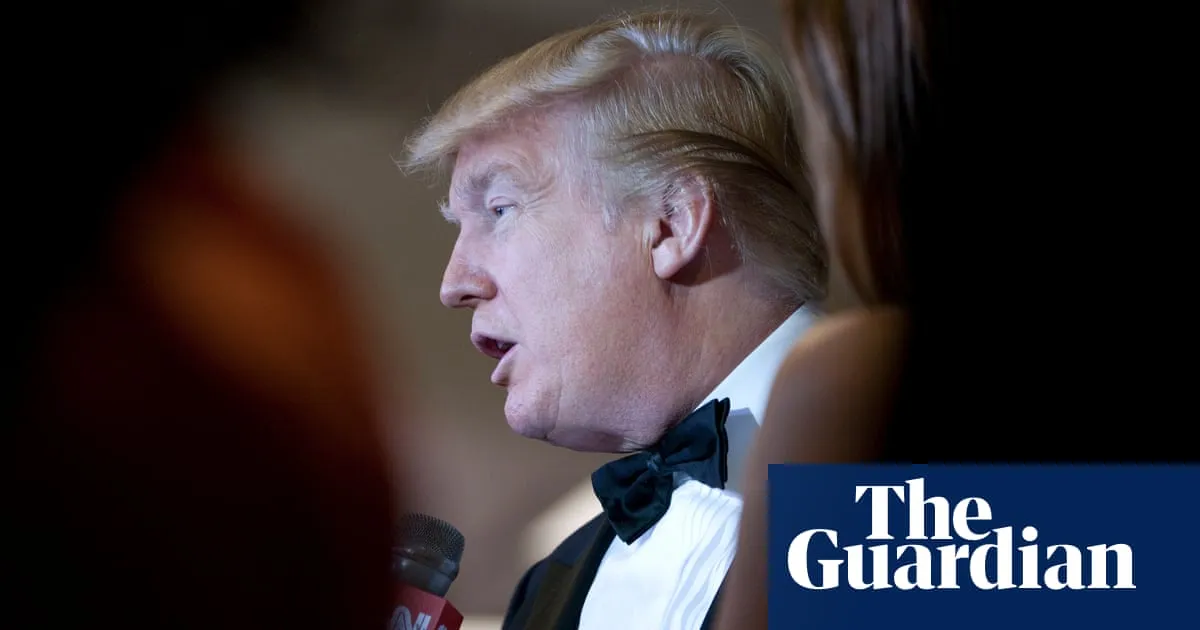
The annual White House Correspondents’ Dinner has historically been a platform where humor meets politics, featuring American presidents delivering comedic speeches alongside entertainers poking fun at the political elite. However, this year's event, scheduled for Saturday night at a downtown Washington hotel, is expected to take on a much more somber tone. Critics liken it to a wake for legacy media, which continues to grapple with the challenges posed by Donald Trump's divisive strategies and the emergence of the MAGA media ecosystem.
President Joe Biden has made efforts to restore decorum at the dinner, having previously invited comedians to lighten the atmosphere. Yet, much like his first term, Trump, who has consistently labeled the press as “the enemy of the people,” will not attend. Most of his staff are also expected to boycott the event, leaving a notable absence in the room. While several news outlets, including the Guardian, plan to be present, a significant void will be felt this year due to the withdrawal of comedian Amber Ruffin's invitation. Ruffin had recently made headlines for her remarks about the Trump administration, which included calling them “kind of a bunch of murderers.”
The White House Correspondents’ Association (WHCA), led by president Eugene Daniels, justified the decision to rescind Ruffin's invitation by stating a desire to focus on honoring journalistic excellence rather than political divisiveness. Daniels emphasized the importance of awarding colleagues for their outstanding work and providing scholarships and mentorship to aspiring journalists. Critics, however, view this move as a capitulation, reflecting the media's struggle to develop a cohesive strategy to counter Trump's persistent attacks on the press.
Since returning to office, Trump has altered the landscape of political media, controlling access to journalists and prioritizing far-right influencers over traditional news outlets. Kurt Bardella, a political commentator and former spokesperson for Breitbart News, expressed skepticism about the dinner's purpose this year. He noted that it would likely become a gathering of disheartened media professionals reflecting on their diminished power during Trump's tenure. Bardella argued that the media's previous unity in fact-checking Trump has eroded, making this year’s dinner feel particularly awkward and possibly embarrassing for those in attendance.
The White House Correspondents’ Dinner has a storied history, dating back to its inception in 1921. It has seen all presidents attend since Calvin Coolidge, with the notable exception of Trump. Past dinners have featured comedians like Stephen Colbert, who famously roasted George W. Bush, and Barack Obama, who mocked a serious-faced Trump. The event typically serves as a celebration of journalism and the First Amendment, recognizing outstanding reporting and raising funds for scholarships. However, the current climate suggests that this year's dinner may focus more on somber reflections than celebratory moments.
Steve Clemons, editor-at-large at the National Interest, hinted that the tone of this year’s event will not be as light-hearted as in the past. He remarked on the pervasive toxicity in the current media environment, suggesting that it may be beneficial for journalists to take a step back and reassess their approach. Clemons supported the decision to revoke Ruffin's invitation, arguing that the dinner should not be a battleground against the presidency, but rather a space for fair and objective journalism.
The WHCA faces the challenging task of representing a diverse membership, encompassing reporters from various media outlets with differing political views. This diversity often complicates consensus on how to navigate Trump’s aggressive tactics against the press. The annual dinner could serve as an opportunity for journalists to regroup and renew a collective mission amidst the relentless pressure of covering Trump’s presidency. However, it also risks becoming a forum for lamenting declining relevance and ineffective strategies against the ongoing war on truth.
The glamour once associated with the White House Correspondents’ Dinner appears to be fading. Sally Quinn, a prominent journalist and socialite, voiced her disdain for the event, describing it as overcrowded and chaotic. She noted that the absence of entertainment this year reflects the current political climate, where humor feels out of place amidst the overwhelming challenges journalists face in covering Trump. Quinn highlighted the fear journalists experience regarding potential repercussions for their reporting, emphasizing the intensity and seriousness of the current media landscape.
As the White House Correspondents’ Dinner approaches, it is clear that this year’s gathering will diverge significantly from its traditional format. With the absence of humor and the presence of palpable tension, attendees will likely engage in serious discussions about the future of journalism in a time marked by division and uncertainty. The event, while still a celebration of journalistic integrity, may serve as a poignant reminder of the challenges that lie ahead for the media in an increasingly polarized political environment.